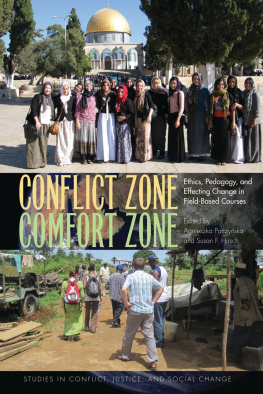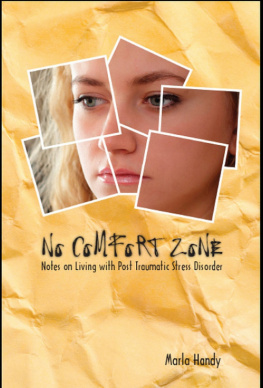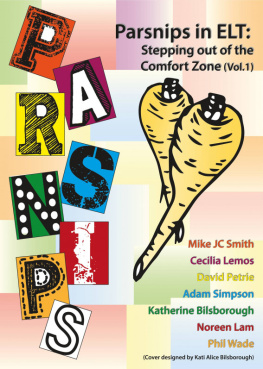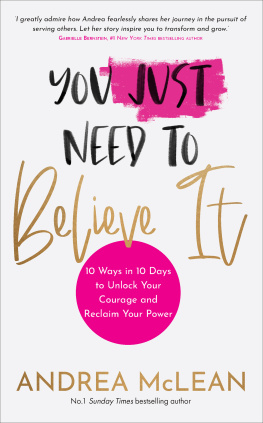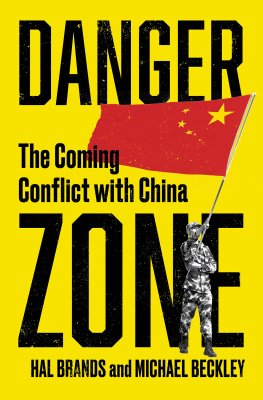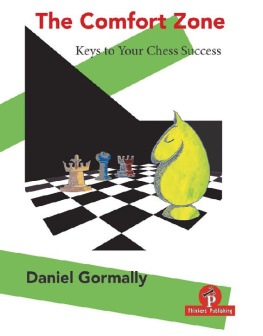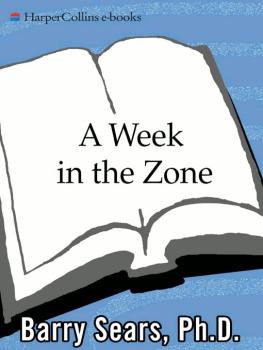CONFLICT ZONE, COMFORT ZONE
STUDIES IN CONFLICT, JUSTICE, AND SOCIAL CHANGE
Series Editors: Susan F. Hirsch and Agnieszka Paczyska
This series is funded in part through the generous support of the School for Conflict Analysis and Resolution at George Mason University.
Susan F. Hirsch and E. Franklin Dukes, Mountaintop Mining in Appalachia: Understanding Stakeholders and Change in Environmental Conflict
David Rawson, Prelude to Genocide: Arusha, Rwanda, and the Failure of Diplomacy
Agnieszka Paczyska and Susan F. Hirsch, eds., Conflict Zone, Comfort Zone: Ethics, Pedagogy, and Effecting Change in Field-Based Courses
CONFLICT ZONE, COMFORT ZONE
Ethics, Pedagogy, and Effecting Change in Field-Based Courses
EDITED BY AGNIESZKA PACZYSKA AND SUSAN F. HIRSCH
OHIO UNIVERSITY PRESS,
ATHENS
Ohio University Press, Athens, Ohio 45701
ohioswallow.com
2019 by Ohio University Press
All rights reserved
Front cover images: (top) Olive Tree Initiative student trip to the Middle East Photo by Daniel Wehrenfennig
(bottom) Students walking the disputed property boundary during GMU field-based course in Liberia Photo by Agnieszka Paczyska
To obtain permission to quote, reprint, or otherwise reproduce or distribute material from Ohio University Press publications, please contact our rights and permissions department at (740) 593-1154 or (740) 593-4536 (fax).
Printed in the United States of America
Ohio University Press books are printed on acid-free paper

29 28 27 26 25 24 23 22 21 20 19 5 4 3 2 1
HARDCOVER ISBN 978-0-8214-2344-8
PAPERBACK ISBN 978-0-8214-2345-5
ELECTRONIC ISBN 978-0-8214-4652-2
Library of Congress Cataloging-in-Publication Data available upon request.
CONTENTS
Agnieszka Paczyska and Susan F. Hirsch
Susan F. Hirsch and Agnieszka Paczyska
Leslie Dwyer and Alison Castel
Pushpa Iyer
Daniel R. Brunstetter and Daniel Wehrenfennig
Jennifer M. Ramos
Allyson M. Lowe and Sandi DiMola
Patricia A. Maulden and Lisa Elaine Shaw
Maryam Z. Deloffre
Gina M. Cerasani and rj nickels
Alexander Cromwell
Anthony C. Ogden and Eric Hartman
Susan F. Hirsch and Agnieszka Paczyska
ACKNOWLEDGMENTS
In 2010, we were thrilled to receive generous financial support from the US Department of Educations Fund for Improvement of Post-Secondary Education (FIPSE) to pursue a research project on experiential learning in the conflict field, which we called Linking Theory to Practice. Our project also benefited from funding through the Point of View Academic Committee of the School for Conflict Analysis and Resolution (S-CAR) at George Mason University.
This volume is one of the products of what became a multifaceted initiative that, over eight years, involved dozens of people to whom we are grateful. We would like to thank our colleagues and friends at George Mason University, especially S-CAR dean Kevin Avruch (and Dean Andrea Bartoli before him), for their support, and Patricia Maulden, Lisa Shaw, and Mara Schoeny, who were with us every step of the way, contributing in multiple ways to the project. Arthur Romano and Leslie Dwyer brought their significant experience with field-based courses to the project at crucial moments. Ned Lazarus and Andria Wisler were, respectively, the inside and outside experts on evaluation for the project. Associate Dean Julie Shedd has provided welcome advice at many junctures.
We want to thank the many former and current undergraduate and graduate students who worked on the project: Rochelle Arms, Alison Castel, Erica Brosnihan, Gina Cerasani, Alexander Cromwell, William David, Habtamu T. Dugo, Ethan Finley, Philip Gamaghelyan, Thanos Gatsias, Kwaw G. de Graft-Johnson, Matthew Graville, Shinae Hong, Samuel W. Johnson, Vandy Kanyako, Linda Keuntje, Mariam Kurtz, Nathaneal Lash, Montserrat Lopez, Amani Mansour, Gul Mescioglu Gur, Mindy Matthews, Julie Minde, Kristin Moriarty, Yasmina Mrabet, Martha Mutisi, Dhirendra Nalbo, Cynthia Nassif, Sixte Vigny Nimuraba, Erika Roberts, Mery Rodriguez, Sarah Rose-Jensen, Alexandra Schaerrer, Lori-Ann Stephenson, Molly Tepper, and Ted Thompson.
Our project would not have succeeded without the efforts of our schools staff. We are grateful to Brydin Banning, Barbara Breckenridge, Jay Moon, Sigrid Nuckolls, Jeremy Peizer, Paul Snodgrass, and Elizabeth A. Thompson.
We thank Terrence Lyons and Michael Sullivan for supporting the project in many ways over the years.
We would like to thank the contributors to this volume. Your willingness to engage with us in workshops, conferences, discussions, and the long process of writing and editing is much appreciated. The book is richer for the range of perspectives that you represent. We thank Michael English for creating a superb index.
We would also like to thank everyone at Ohio University Press and especially Gillian Berchowitz and Rick Huard for their enthusiasm for this project and guidance through the editing and publication process. And many thanks to Nancy Basmajian and Don McKeon for the help with final preparation of the manuscript for publication.
Finally, we thank each other; it has been great fun to work together on the project and on this book.
Introduction
The Benefits and Challenges of Field-Based Courses in Conflict Zones
AGNIESZKA PACZYSKA AND SUSAN F. HIRSCH
This edited volume showcases new approaches to field-based learning in the most difficult of places: conflict zones in the United States and abroad. Increasingly, and for good reason, postsecondary education incorporates experiential learning options, such as service learning, study-abroad, and other field-based courses. Whether in domestic or international contexts, such courses engage students more directly in comparison to classroom-based learning, as they offer the opportunity to apply theory to practice in real-life settings. Instructors appreciate the educational value of experiential courses yet acknowledge that certain requirements for teaching in field settingsfor example, using innovative pedagogy and addressing ethical predicamentspose challenges to even the most seasoned instructor.
For both instructors and students, the challenges deepen when the field for a field-based course is a site of active or recent conflict. The chapters in this volume illustrate how the challenges of field-based classes are magnified in conflict and postconflict contexts, where students can experience the complexity of conflict, and the dilemmas faced by those seeking to resolve it, in ways not possible in the classroom. Such conflict zones can be found in a variety of settings: in community meetings in Pittsburgh where working-class, long-term residents of German and Eastern European descent experience strained relationships with newly arrived Somali refugees; in West Virginia mining towns where tensions run high as residents debate the effects of mountaintop mining on employment and the environment; in the streets of Jerusalem and Bilin in the West Bank where Israelis and Palestinians contest over land, political power, and historical narratives; and in Tubmanburg, Liberia, where relatives fight over the demarcation of boundaries between their farms. Field-based courses in such settings allow students to encounter the dynamics of conflict in ways that are difficult, if not impossible, to replicate in the traditional classroom. By engaging students both intellectually and emotionally, they provide unique opportunities for linking theory to practice and also for self-reflection and thus give students a deeper understanding of the complexities of conflict and the challenges of working with people who are experiencing conflict.

